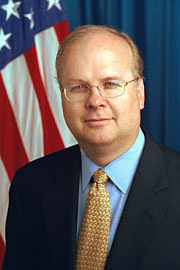This is an old revision of this page, as edited by Empyrix (talk | contribs) at 01:43, 16 May 2004. The present address (URL) is a permanent link to this revision, which may differ significantly from the current revision.
Revision as of 01:43, 16 May 2004 by Empyrix (talk | contribs)(diff) ← Previous revision | Latest revision (diff) | Newer revision → (diff) Karl Rove
Karl Rove
Karl Rove (born December 25, 1950 in Denver, Colorado) is currently U.S. President George W. Bush's chief political strategist.
After dropping out of the University of Utah in 1971, Karl Rove began his political career with the College Republicans, which he chaired from 1973-1974. For the next few years, he worked in various Republican circles and assisted George H. W. Bush's 1980 presidential campaign.
In 1981, Rove founded a direct mail consulting firm, Karl Rove & Co., based out of Austin, Texas. This firm's first clients included Republican Governor Bill Clements and Democratic Congressman Phil Gramm, who later became a Republican. In 1993, Rove began advising George W. Bush's gubernatorial campaign. He continued, however, to operate his consulting business until 1999, when he sold the firm to focus his efforts on Bush's bid for the presidency.
After Bush became the 43rd president, Karl Rove became a Senior Advisor to the President. Rove is generally considered one of the most influential advisors in the Bush administration, and he has earned a reputation as an aggressive campaigner.
Controversial history
Rove is known for his singularly aggressive political tactics. In 1970, he sneaked into the campaign office of Illinois Democrat Alan Dixon and stole some letterhead. He printed fliers on the letterhead promising "free beer, free food, girls and a good time for nothing" and distributed the fliers at rock concerts and homeless shelters. Admitting to the incident much later, Rove said, "I was nineteen and I got involved in a political prank."
After dropping out of the University of Utah in 1971, Karl Rove started his political career as the executive director of the College Republican National Committee. He held this position until 1972 when he became the National Chairman of the College Republicans (1973-1974). As chairman, Rove had access to many powerful politicians and government officials during the Watergate scandal, including then CIA director George H. W. Bush. For the next few years, he worked in various Republican circles and assisted George H. W. Bush's 1980 presidential campaign. Rove's greatest claim to fame at the time was that he had introduced Bush to Lee Atwater.
In 1993, according to the New York Times, John Ashcroft's campaign paid Karl Rove & Co. over $300,000 to aid his Senate race. In 1999, the George Walker Bush campaign effort paid Karl Rove & Co. $2.5 million for July through December. According to Rove, "About 30 percent of that is postage."
In early 2000, during the Republican Primary, Senator John McCain led George W. Bush in the race for the Republican presidential nomination and won several state primaries. A whisper campaign was allegedly launched against McCain: telemarketers were allegedly hired to call voters in South Carolina, claiming that McCain was mentally unstable due to torture he had endured as a prisoner of war in Vietnam, and that he had fathered an illegitimate child with a black woman. These allegations had no basis in fact. A reporter, Wayne Slater, suggested in print that Rove might be behind the whisper campaign. Rove denied any involvement. McCain's support subsequently dwindled, and Bush won the nomination. (There were other factors in that primary contest as well, including a long exchange of negative television advertisements between the two candidates.)
After the presidential elections in November 2000, Karl Rove organized an emergency migration of Republican politicians and supporters to Florida to assist the Bush campaign during the recount.
George W. Bush was inaugurated in January 2001. Karl Rove accepted a position in the Bush administration as Senior Advisor to the President.
In March 2001, Rove met with executives from Intel, successfully advocating a merger between a Dutch company and an Intel company supplier. Rove owned $100,000 in Intel Co. stock at the time. In June 2001, Rove met with two pharmaceutical industry lobbyists. At the time, Rove held almost $250,000 in drug industry stocks. On 30 June 2001, Rove divested his stocks in 23 companies, which included more than $100,000 in each Enron, Boeing, General Electric, and Pfizer. On 30 June 2001, the White House admitted that Rove was involved in administration energy policy meetings, while at the same time holding stock in energy companies including Enron.
On 10 April 2003, Arnold Schwarzenegger met with Rove to discuss whether the actor should run for Governor of California in 2006.
On 14 May 2003, during a meeting with South Korean president Roh Moo-hyun, President George W. Bush brought only Rove and Condoleezza Rice.
On 29 August 2003, retired ambassador Joseph C. Wilson named Rove as the White House official who leaked to the press the identity of a CIA operative as the wife of a prominent journalist and Bush administration critic. The White House denied the allegation. See Valerie Plame.
Other facts
George W. Bush's pet name for Karl Rove is "turd blossom".
External links
- Karl Rove - Rotten.com bio
- Karl Rove - Disinfopedia article
- Joseph C. Wilson IV - Disinfopedia article
Further Reading
- Boy Genius: Karl Rove, the Brains Behind the Remarkable Political Triumph of George W. Bush, Lou Dubose, Jan Reid and Carl Cannon, 2003, Paperback, 256 pages, ISBN 1586481924.
- Bush's Brain: How Karl Rove Made George W. Bush Presidential, James C. Moore and Wayne Slater, John Wiley and Sons, 2003, hardcover, 416 pages, ISBN 0471423270.